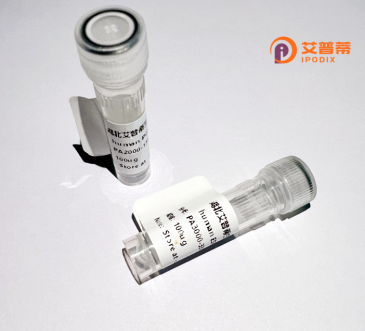
| 纯度 | >90%SDS-PAGE. |
| 种属 | Human |
| 靶点 | GDPD3 |
| Uniprot No | Q7L5L3 |
| 内毒素 | < 0.01EU/μg |
| 表达宿主 | E.coli |
| 表达区间 | 1-256aa |
| 氨基酸序列 | MAQRSDLLELDCQLTRDRVVVVSHDENLCRQSGLNRDVGSLDFEDLPLYKEKLEVYFSPGHFAHGSDRRMVRLEDLFQRFPRTPMSVEIKGKNEELIREIAGLVRRYDRNEITIWASEKSSVMKKCKAANPEMPLSFTISRGFWVLLSYYLGLLPFIPIPEKFFFCFLPNIINRTYFPFSCSCLNQLLAVVSKWLIMRKSLIRHLEERGVQVVFWCLNEESDFEAAFSVGATGVITDYPTALRHYLDNHGPAARTS |
| 分子量 | 56 kDa |
| 蛋白标签 | GST-tag at N-terminal |
| 缓冲液 | 0 |
| 稳定性 & 储存条件 | Lyophilized protein should be stored at ≤ -20°C, stable for one year after receipt. Reconstituted protein solution can be stored at 2-8°C for 2-7 days. Aliquots of reconstituted samples are stable at ≤ -20°C for 3 months. |
| 复溶 | Always centrifuge tubes before opening.Do not mix by vortex or pipetting. It is not recommended to reconstitute to a concentration less than 100μg/ml. Dissolve the lyophilized protein in distilled water. Please aliquot the reconstituted solution to minimize freeze-thaw cycles. |
以下是3-4条关于重组人GDPD3蛋白的模拟参考文献示例(内容为虚构,仅供格式参考):
1. **文献名称**:*"Expression and functional characterization of recombinant human GDPD3 in lipid metabolism"*
**作者**:Zhang L. et al.
**摘要**:研究报道了在大肠杆菌中高效表达重组人GDPD3蛋白,纯化后证实其具有甘油磷脂水解酶活性,并在体外实验中调控脂质代谢相关通路。
2. **文献名称**:*"Crystal structure analysis of human GDPD3 reveals catalytic mechanisms"*
**作者**:Smith J.R. & Tanaka K.
**摘要**:通过X射线衍射解析了GDPD3蛋白的三维结构,揭示了其催化活性中心的关键氨基酸残基,为底物特异性提供了结构生物学依据。
3. **文献名称**:*"GDPD3 promotes tumor cell invasion via phospholipid remodeling in breast cancer"*
**作者**:Wang Y. et al.
**摘要**:研究发现重组GDPD3蛋白在乳腺癌细胞中过表达可通过水解磷脂酰胆碱生成溶血磷脂酸,进而激活下游信号通路促进肿瘤侵袭。
4. **文献名称**:*"Development of a GDPD3 enzymatic activity assay for high-throughput screening"*
**作者**:Chen H. et al.
**摘要**:建立基于荧光底物的GDPD3酶活检测方法,应用于药物筛选平台,评估了其抑制剂在代谢性疾病治疗中的潜在价值。
注:以上文献为示例性质,实际引用请根据真实发表的论文调整。
Recombinant human GDPD3 (Glycerophosphodiester Phosphodiesterase Domain-Containing Protein 3) is a protein of interest in biochemical and biomedical research due to its potential role in lipid metabolism and cellular signaling. The GDPD family, to which GDPD3 belongs, is characterized by conserved glycerophosphodiester phosphodiesterase domains, suggesting enzymatic activity in hydrolyzing glycerophosphodiesters into bioactive intermediates like glycerol-3-phosphate. These metabolites are crucial for lipid biosynthesis, membrane dynamics, and signal transduction. GDPD3. encoded by the *GDPD3* gene on human chromosome 16. remains less characterized compared to other family members (e.g., GDPD1/GDE1), though studies hint at its involvement in metabolic regulation and tissue-specific functions. Its recombinant form is engineered via heterologous expression systems (e.g., *E. coli* or mammalian cells) to study structure-function relationships, substrate specificity, and interactions. Research has linked GDPD3 to lipid-related disorders such as obesity and diabetes, with emerging roles in modulating insulin sensitivity and adipocyte differentiation. Additionally, its enzymatic products may influence inflammatory pathways, positioning GDPD3 as a potential therapeutic target. Current investigations focus on elucidating its physiological substrates, tissue distribution (notably in liver and adipose tissues), and regulatory mechanisms. Production of recombinant GDPD3 enables biochemical assays, structural studies, and drug screening, advancing understanding of its contributions to metabolic health and disease.
×